When the computer communicates using any given protocol, it will support doing so, without prejudice, via whatever code you choose (assuming the code implements the intended protocol), and it will do nothing to help any other part of the Internet to distinguish which code you are using or what changes you may have made in it, or to discriminate based on your choice.
- Sep 2024
-
www.gnu.org www.gnu.org
-
-
github.com github.com
-
My long term vision for Falcon is to make a web application platform which trivializes server deployment. Ideally, a web application can fully describe all its components: HTTP servers, databases, periodic jobs, background jobs, remote management, etc. Currently, it is not uncommon for all these facets to be handled independently in platform specific ways. This can make it difficult to set up new instances as well as make changes to underlying infrastructure. I hope Falcon can address some of these issues in a platform agnostic way.
-
- Jun 2024
-
forum.gitlab.com forum.gitlab.com
-
How can I make it work on my local runner and also for forks who cannot use my runner on GitLab.com 2 wth the provided SaaS runners?
-
- Mar 2024
-
getpocket.com getpocket.com
-
What if I don’t live in California?Only California residents have the right to data deletion under CCPA. (Why companies have the right to your data and you do not is another story. And here’s another. And another.)But some companies have said they’ll honor deletion requests no matter where you live. Spotify, Uber and Twitter said they treat deletion requests from any geographic location the same. Netflix, Microsoft, Starbucks and UPS have also said they’ll extend CCPA rights to all Americans.
-
-
stackoverflow.com stackoverflow.com
-
It's not so much a criticism as the preference of a more universal solution over a more limited one. Please consider that, years later, people (like me) will stop by to look for this answer and may be pleased to find one that's useful in a wider scope than the original question. As they say in the Open Source world: "choice is good!"
-
- Jan 2024
-
gitlab.com gitlab.com
-
Although, the discussion above has only been considering Figma, we need to keep in mind that there are other design tools out there.
-
Connecting with Figma should be done via an integration because not all orgs use Figma.
-
Two way commenting is a good idea as it would allow a natural way of others to interact with designers without requiring to understand how to use Figma.
-
- Apr 2023
-
learn.microsoft.com learn.microsoft.com
-
A primary advantage of REST over HTTP is that it uses open standards, and does not bind the implementation of the API or the client applications to any specific implementation.
-
- Sep 2022
-
www.rfc-editor.org www.rfc-editor.org
-
However, links between resources need not be format specific; it can be useful to have typed links that are independent of their serialisation, especially when a resource has representations in multiple formats.
-
-
rbspy.github.io rbspy.github.io
-
Nothing in the profiling guide is Ruby- or rbspy-specific — it all applies to profiling in general.
-
- Aug 2022
-
-
I'm building a Rails API with a separate web frontend app as "just another API client" (various smartphone apps to follow as well). In the previous "monolithic" version of the service, where all the server side was rolled into one Rails app
-
- Nov 2021
-
www.reddit.com www.reddit.com
-
Because flatpaks are distro agnostic, while you may prefer to have the distro's native package format you have to understand maintaining a a deb, rpm, etc simultaneously can be a real pain in the ass that you either deal with or you simply choose not to support certain formats and thus certain distros. With Flatpak is one package for all distros, or at least that's the idea.
-
- Sep 2021
-
github.com github.com
-
while we figure out how to best include HMR support in the compiler itself (which is tricky to do without unfairly favoring any particular dev tooling)
-
-
testing-library.com testing-library.com
-
though we recommend Jest as our preference, the library works with any framework
-
- Jun 2021
-
github.com github.com
-
AnyCable allows you to use any WebSocket server (written in any language) as a replacement for your Ruby server (such as Faye, Action Cable, etc).
-
-
github.com github.com
-
I'm not sure if there's any cost in terms of contributing either, especially when by design git can have any branch as default, and will not hinder your experience when you use something other than master.
git is neutral/unbiased/agnostic about default branch name by design
And that is a good thing
-
-
twitter.com twitter.com
-
So ActionCable needs Redis! Is this the first time Rails is aligning with a vendor product? Why not abstract it like AR/AJ?
-
-
github.com github.com
-
Minimal dependencies (no explicit rspec, minitest, redis, pg dependencies)
Tags
Annotators
URL
-
-
babeljs.io babeljs.io
-
Babel implements multiple variants of this proposal to help TC39 test and gather feedback from the community. As with all proposals, expect changes in the future.
-
- Apr 2021
-
github.com github.com
-
These example are for Rails applications, but there is no dependency on Rails for using this gem. Most of the examples are applicable to any Ruby application.
-
-
stackoverflow.com stackoverflow.com
-
Is there an OS agnostic way of doing this? I like the script command on macOS because you don't have to wrap the command in quotes. The script runs and sends output to the tty which is duplicated in the supplied file, but I can't seem to get the linux version to behave the same way... I'm probably doing something wrong. So what's the equivalent linux script command for this on macOS: script -q -t 0 tmp.out perl -e 'print "Test\n"' Test cat tmp.out Test
-
-
store.steampowered.com store.steampowered.com
-
(note: this is meant to be an informational review, not a positive or negative review)
-
- Mar 2021
-
www.chevtek.io www.chevtek.io
-
Write modules that are agnostic about the source of their input or the destination of their output.
-
-
www.sitepoint.com www.sitepoint.com
-
JavaScript needs to fly from its comfy nest, and learn to survive on its own, on equal terms with other languages and run-times. It’s time to grow up, kid.
Tags
- separation of concerns
- neutral ground
- competition in open-source software
- level playing field
- neutral/unbiased/agnostic
- JavaScript: as a process VM
- avoid giving partiality/advantage/bias to any specific option
- programming languages: choosing the best language for the job
- good idea
Annotators
URL
-
-
www.codemag.com www.codemag.com
-
Another important MicroJS attribute is independence. Ember, Backbone—even Bootstrap to a degree–have hard dependencies on other libraries. For example, all three rely on jQuery. A good MicroJS library stands by itself with no dependencies. There are exceptions to the rule, but in general, any dependency is another small MicrojJS library.
-
- Feb 2021
-
trailblazer.to trailblazer.to
-
The fact we’re using ActiveRecord (or something looking like it) doesn’t mean Trailblazer only works with Rails! Most people are familiar with its API, so we chose to use “ActiveRecord” in this tutorial.
-
At this stage, routing, controllers, etc is irrelevant. Just imagine a Rails controller action, a Sinatra router or a Hanami action as follows.
-
- Oct 2020
-
medium.com medium.com
-
In my opinion it is okay to say your tool is revolutionary compared to existing ones. And it is hard to be fully unbiased about your own creation, I get it.
-
- Aug 2020
-
www.nationalgeographic.com www.nationalgeographic.com
-
Why antibodies may not be the key to beating coronavirus
Overall scientific credibility: 'very high', according to scientists who analyzed this article.
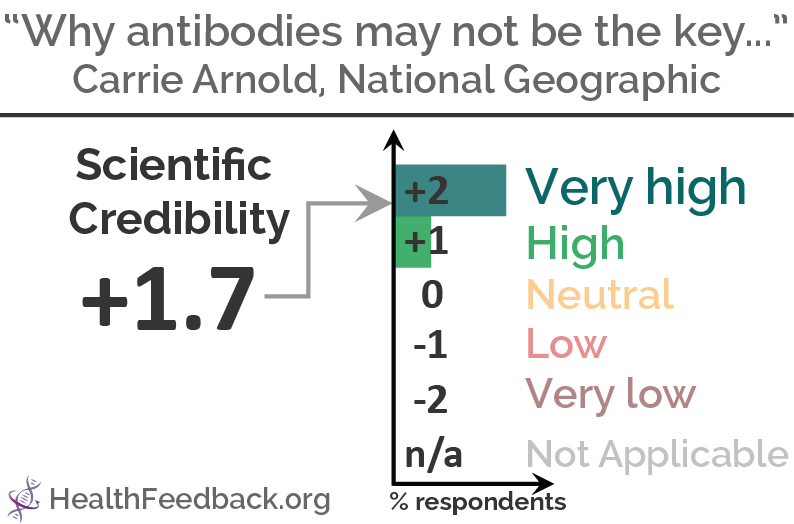
Find more details in Health Feedback's analysis
-
- Dec 2019
-
babeljs.io babeljs.io
-
Previously, we would add the proposal plugin to the config and that was it. Now, we remove the default behavior and ask users to opt into a flag that shows which proposal is chosen, and make it clear that there isn't a fixed (or even favored) option at the moment.
-
- Oct 2018
-
www.theguardian.com www.theguardian.com
-
Scientists say halting deforestation 'just as urgent' as reducing emissions
Overall scientific credibility: 'neutral' to 'high', according to scientists who analyzed this article.
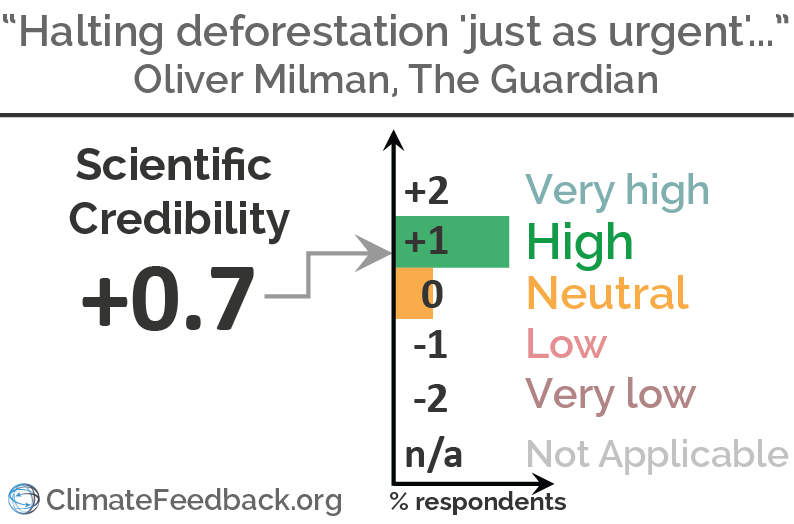
Find more details in the annotations below and in Climate Feedback's analysis
-
- Aug 2017
-
www.nytimes.com www.nytimes.com
-
Alaska’s PermafrostIs Thawing
Overall scientific credibility: 'high' to 'very high', according to scientists who analyzed this article.
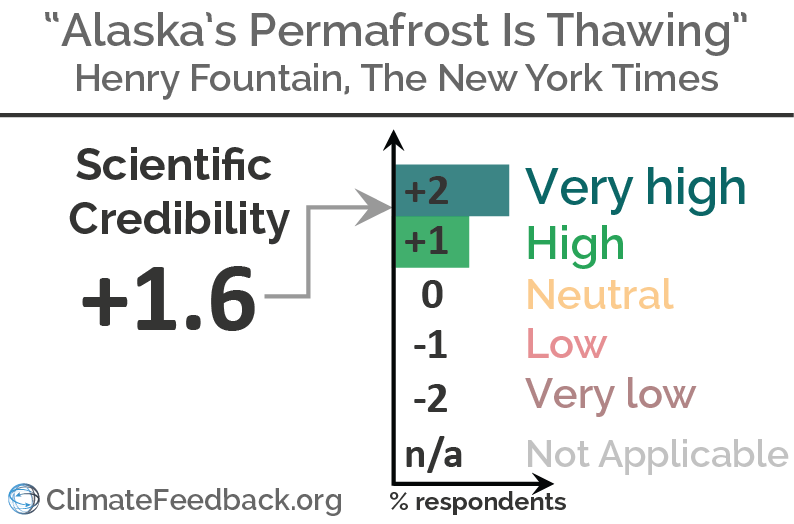
Find more details in the annotations below and in Climate Feedback's analysis
-
- Feb 2017
-
-
Here’s why it's so frickin’ hot right now window.variationsTitleElem = $('article header h1.title');
Overall scientific credibility: 'high', according to 3 scientists who analyzed this article.
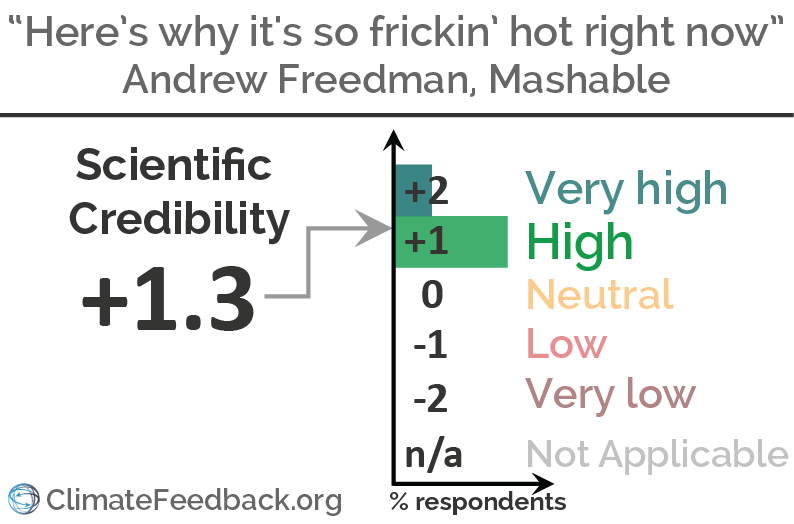
Find more details in the annotations below and in Climate Feedback's analysis
-
- Dec 2016
-
www.usatoday.com www.usatoday.com
-
Australia’s Great Barrier Reef has worst coral die-off ever
Overall scientific credibility: 'high' to 'very high', according to 5 scientists who analyzed this article.
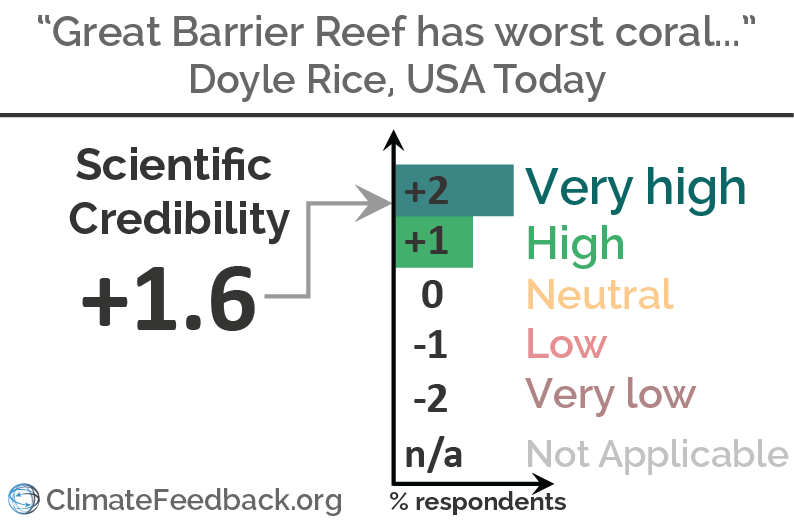
Find more details in the annotations below and in Climate Feedback's analysis
-
-
www.cnn.com www.cnn.com
-
Amid higher global temperatures, sea ice at record lows at poles
Overall scientific credibility: 'very high', according to 5 scientists who analyzed this article.
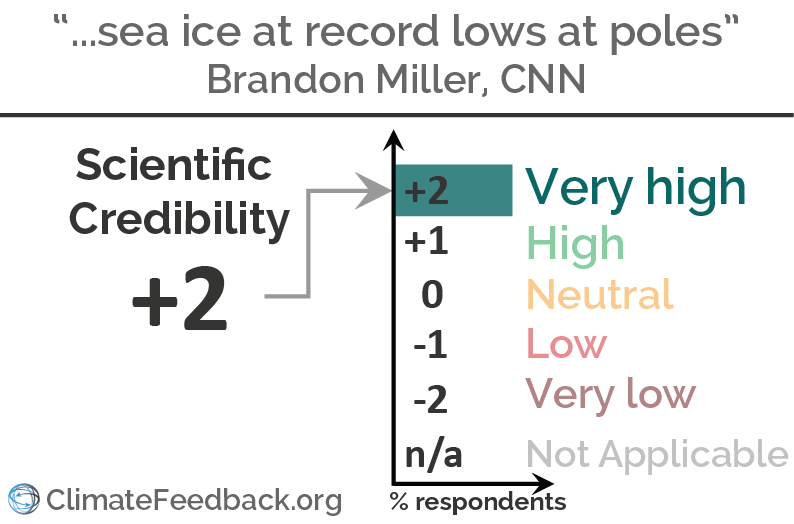
Find more details in the annotations below and in Climate Feedback's analysis
-
- Sep 2016
-
www.theguardian.com www.theguardian.com
-
Greenland's huge annual ice loss is even worse than thought
Overall scientific credibility: 'very high', according to 7 scientists who analyzed this article.
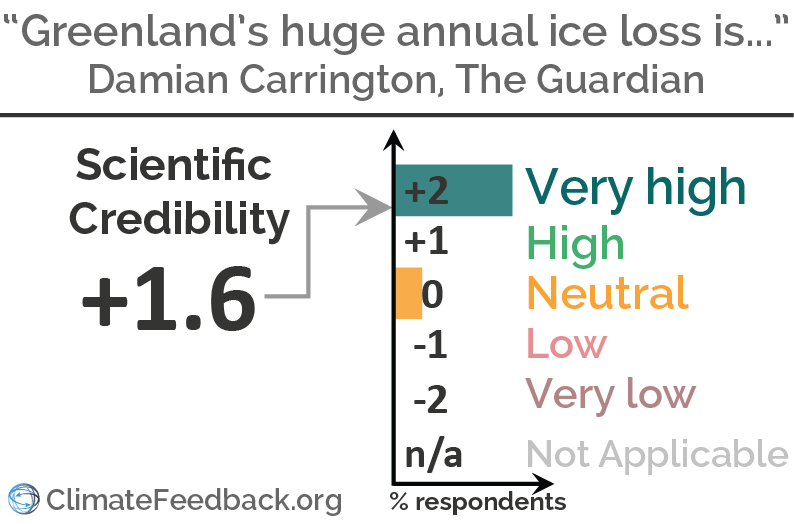
Find more details in the annotations below and in Climate Feedback's analysis
-
- Aug 2016
-
www.theguardian.com www.theguardian.com
-
Disasters like Louisiana floods will worsen as planet warms, scientists warn
Overall scientific credibility: 'high', according to the 7 scientists who analyzed this article.
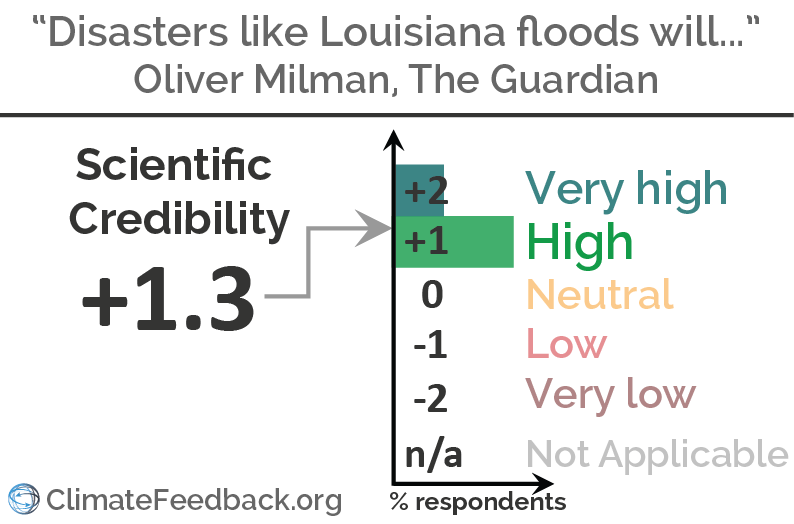
Find more details in the annotations below and in Climate Feedback's analysis
-
- Jul 2016
-
www.washingtonpost.com www.washingtonpost.com
-
Thanks to climate change, the Arctic is turning green The inside track on Washington politics. Be the first to know about new stories from PowerPost. Sign up to follow, and we’ll e-mail you free updates as they’re published. You’ll receive free e-mail news updates each time a new story is published. You’re all set! Sign up *Invalid email address Got it Got it
Overall scientific credibility: 'neutral' to 'high', according to the 8 scientists who analyzed this article.
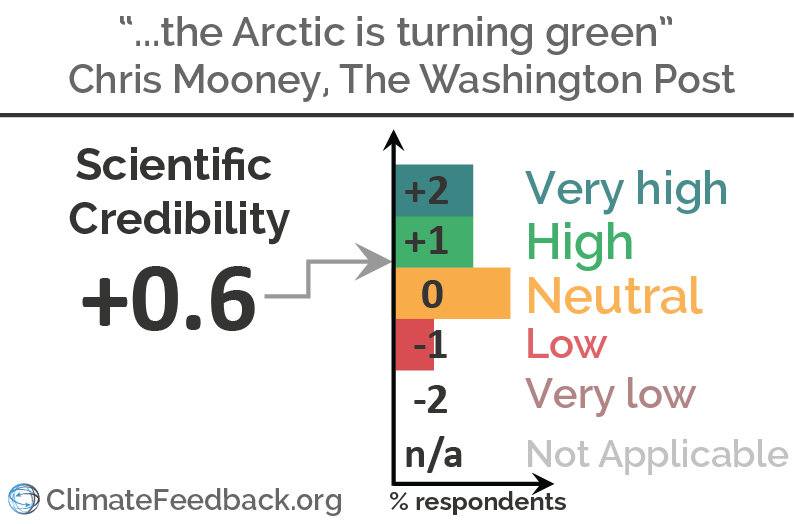
Find more details in the annotations below and in Climate Feedback's analysis
-
- Jan 2016
-
www.nytimes.com www.nytimes.com
-
2015 Was Hottest Year in Historical Record, Scientists Say
Overall scientific credibility: 'very high', according to 8 scientists who analyzed this article.
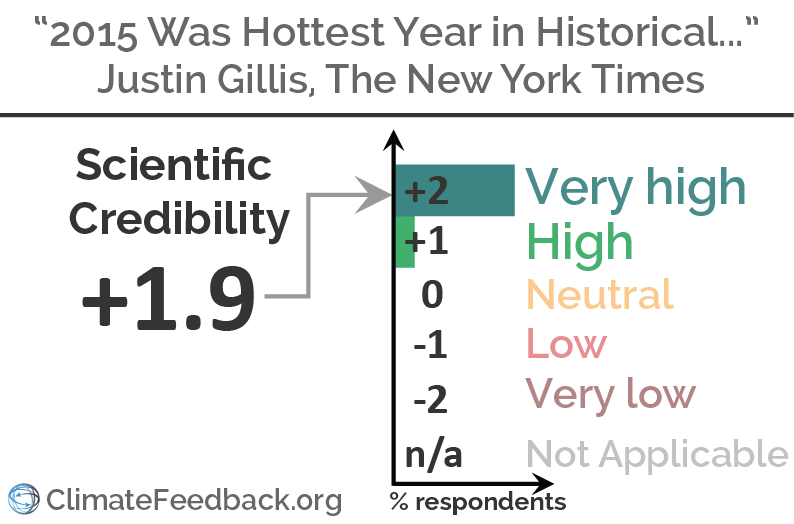
Find more details in the reply+annotations below and in Climate Feedback's analysis
-
- May 2015
-
-
Climate: 9 questions on rising seas
Overall scientific credibility: 'high', according to the 7 climate scientists who analyzed this article.

Find more details in the reply+annotations below and in ClimateFeedback's analysis featuring contributions by Eric Rignot
-
- Jan 2015
-
www.nytimes.com www.nytimes.com
-
2014 Breaks Heat Record
Overall scientific credibility: 'high' to 'very high', according to 8 climate scientists who evaluated this article.

Find more details in the annotations below and here
jgdwyer:
This article accurately describes global warming and puts the news that 2014 is the hottest year on record into appropriate context. The article does a very good job of distinguishing between climate variability and climate change with helpful discussion on ENSO and the relatively cold temperatures in the Eastern United States (while staying within the bounds of the mainstream climate science understanding).
karmour:
Very good article overall. I do wish the author had fact checked the incorrect claim by Dr. Christy (that global temperatures have not changed since the end of the 20th century) prior to including his quote in the article.
aklocker:
Scientifically this article seems to be correct but it could be a bit more precise in some of its statements. One thing I like is that it mentions different opinions on some points where scientists do not agree rather than giving a biased story.
bmv:
This article does a good job of putting the 2014 temperature record in context with quotes from experts and good descriptions of relevant issues such as El Nino. References to "skeptics" were appropriately followed up by evidence of their misinterpretation/mischaracterization of the data.
aalpert:
This article provides an accurate and well supported evaluation of the finding that 2014 was the hottest year on record.
emvincent:
Overall, this article is fair in its representation of the 2014 temperature record event and in reminding the context of the long-term warming trend+natural climate variability.
alexis.tantet:
The quality of this article is overall higher than most newspaper articles on climate change as it avoids the usual pitfalls such as confusing year to year variability with long-term change. It also addresses issues prone to confusion, such as why eastern USA did not experience such a warm year as most of the globe, which can help the readers to put the science in perspective with the seasonal climate they have actually experienced. The fact that the article focuses mostly on the observational record and not on theoretical or modeling studies may be a weakness, but the scope of an article cannot be too broad.
-